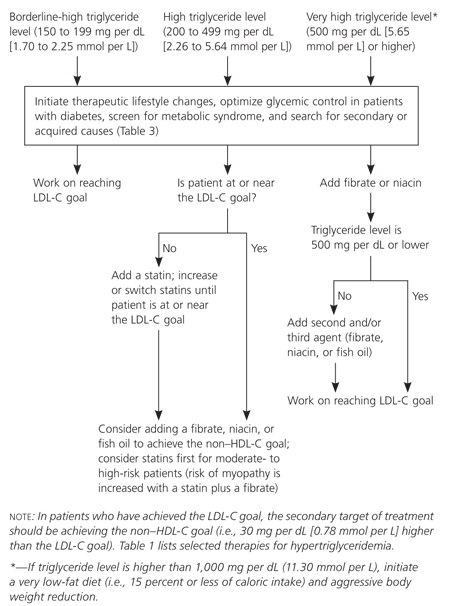
Am Fam Physician. 2008;77(4):417-418
to the editor: In the article, “Management of Hypertriglyceridemia,” the authors cover the various medical treatment options for hypertriglyceridemia.1 They briefly mention the importance of weight control as an initial consideration and recommend a very low-fat diet for patients with very high triglyceride levels. However, they did not consider results of the latest studies validating carbohydrate-controlled dieting in the treatment of hypertriglyceridemia and low levels of high-density lipoprotein (HDL) cholesterol.
Since the publication of the National Cholesterol Education Program (NCEP) final report in 2002, there have been six quality randomized controlled trials published showing the superiority of carbohydrate-controlled dieting over low-fat dieting in the management of triglyceride levels.2–6 In head-to-head comparisons with low-fat diet groups, carbohydrate-controlled groups consistently resulted in equal or superior weight loss. The carbohydrate-controlled dieters consistently showed an improvement in triglyceride and HDL cholesterol levels above the improvement seen in low-fat dieters, independent of achieved weight loss. The positive impact of carbohydrate-controlled dieting on lowering triglyceride levels in high-risk patients is often underestimated and not emphasized in practice.
in reply: We appreciate the comments regarding our article.1 With regards to our recommendations for the treatment of hypertriglyceridemia using statins, Dr. Raghavan suggests that fibrates, niacin, or fish oil should play a more prominent role. We agree with his comments about the pharmacotherapy of patients with very high levels of serum triglycerides (at least 500 mg per dL [5.65 mmol per L]), which is supported in our article. However, for patients with lower degrees of triglyceride elevation (between 200 and 499 mg per dL [2.26 to 5.64 mmol per L]) the current treatment guidelines emphasize low-density lipoprotein (LDL)-cholesterol as the main target of therapy, followed by non-high-density lipoprotein cholesterol.1 The overwhelming literature on the benefit of statins recommends it as a first-line option in patients with no contraindications who are at moderate to high cardiovascular risk and have elevated LDL cholesterol levels.
Dr. Raghavan also purports that our algorithm is misleading. We agree that most patients with severe hypertriglyceridemia (at least 1,000 mg per dL [11.30 mmol per L]) will require medication with lifestyle modifications to reduce the risk of pancreatitis. However, the National Cholesterol Education Program (NCEP) guidelines recommend that all patients immediately start on a very low-fat diet and that the patients' medical history be reviewed by the physician for any evidence of acquired or secondary causes of hypertriglyceridemia.2 Many medications may elevate triglyceride levels, and insulin or oral hypoglycemics may adequately control hypertriglyceridemia. Although these interventions may not completely normalize triglyceride levels, even those with severe hypertriglyceridemia can significantly reduce levels to less than 500 mg per dL with dietary interventions alone.3 Close follow-up is required, and pharmacotherapy should be initiated if dietary and lifestyle measures do not adequately lower triglycerides. However, we agree that the algorithm in our article may inadvertently de-emphasize the importance of drug therapy and we have made modifications accordingly (see accompanying revised Figure 1).

Dr. Virji suggests that patients with hypertriglyceridemia may benefit from a carbohydrate-controlled diet. Two of the articles he cites involve severely obese patients randomized to carbohydrate-controlled diets or more traditionally recommended low-fat diets.4–5 Patients randomized to the low-fat diet, on average, failed to significantly alter their diets to reach the NCEP recommended goal of less than 30 percent of daily calories from fat.4–5 Another article compared patients in various dietary programs, but did not directly compare carbohydrate-controlled diets with a low-fat diet.6 Only one of these trials had a randomized group with hypertriglyceridemia at baseline (defined as greater than 200 mg per dL).4 Research suggests that the response to low-fat versus carbohydrate-controlled diets varies with the degree of hypertriglyceridemia, such that patients with lower degrees of triglyceride elevation respond more to a carbohydrate-controlled diet, whereas patients with more pronounced triglyceride elevations respond more to a low-fat diet.2 A low-carbohydrate approach in the management of hypertriglyceridemia in certain patient populations is promising and should be studied further. Dietary counseling should always be individualized, and consultation with a certified nutritionist may improve adherence to lifelong dietary changes.
editor's note: The editors of American Family Physician (AFP) would like to use the opportunity presented by Dr. Oh's financial disclosure to clarify our policy regarding author conflicts of interest. AFP does not consider papers that are sponsored directly or indirectly by a pharmaceutical company, public relations firm, or other commercial entity. We also strongly prefer that authors do not have a financial interest in or arrangement with any organization with a direct interest in the subject of the submitted article. Authors who develop new financial interests in or arrangements with a relevant organization after completing our Author Disclosure form and submitting their manuscripts, but prior to the publication of that article, are asked to update their disclosure form and send it to our editorial office in Washington, D.C. The editors of American Family Physician carefully review changes in such affiliations to determine what actions are appropriate to resolve new conflicts of interest.